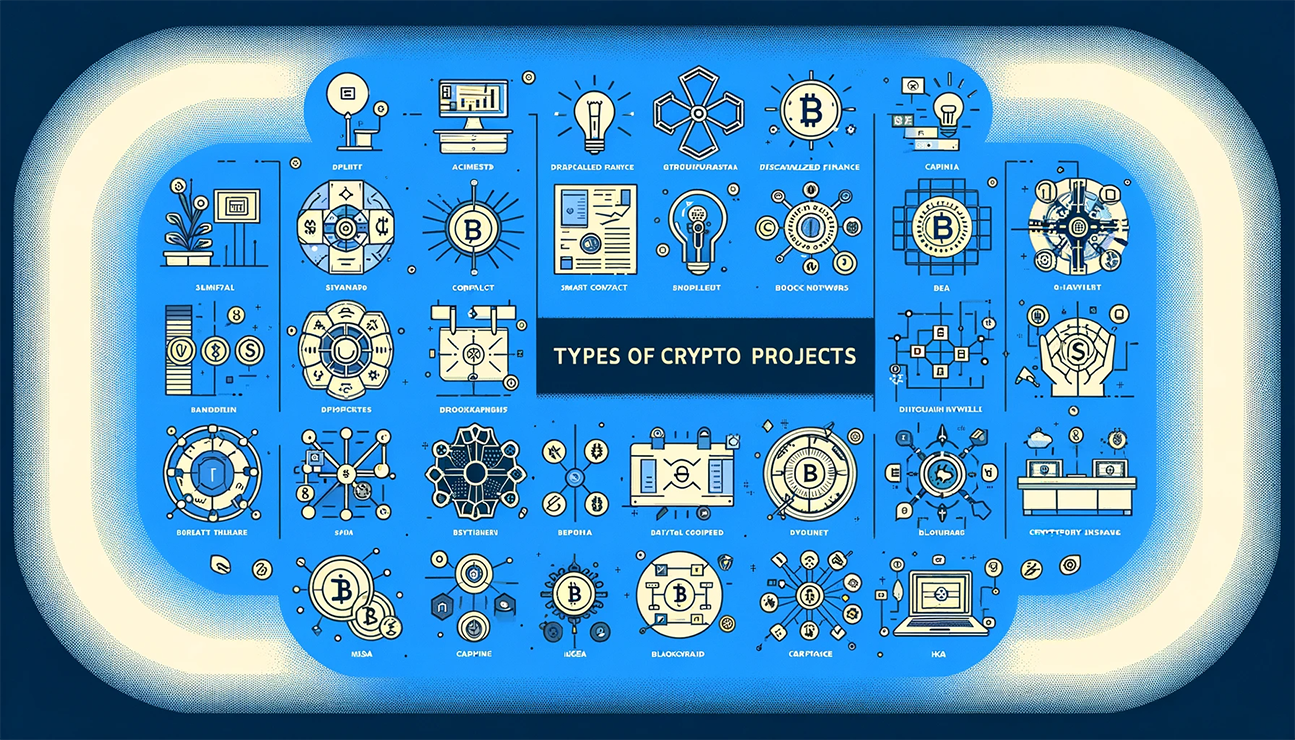Cryptocurrency has made a remarkable impact on the world of finance and technology. As the popularity of cryptocurrency continues to grow, so does the number of crypto projects that emerge in the market. These projects offer various solutions and applications, catering to different needs and interests. In this comprehensive guide, we will explore the different types of crypto projects, their evolution, and factors to consider when evaluating them.
Understanding Cryptocurrency
To grasp the diverse world of different types of crypto projects, it is essential to have a solid understanding of cryptocurrency itself. Cryptocurrency is a digital or virtual form of currency that uses cryptography for security. It operates on a technology called blockchain, which is essentially a decentralized digital ledger. Cryptocurrencies, such as Bitcoin and Ethereum, have gained immense popularity due to their potential for transparency, decentralization, and security.
When delving into the basics of cryptocurrency, it is important to understand how these digital currencies are created. Cryptocurrencies are generated through a process called mining. Mining involves powerful computers solving complex mathematical problems to validate and record transactions on the blockchain. These transactions are grouped into blocks, forming a chain of blocks, hence the name “blockchain“. The decentralized nature of blockchain technology ensures that there is no central authority controlling the transactions.
Furthermore, cryptocurrencies offer numerous benefits beyond traditional fiat currencies. One of the key advantages is faster and cheaper cross-border transactions. With traditional banking systems, sending money across borders can be time-consuming and expensive due to intermediaries and fees. Cryptocurrencies eliminate the need for intermediaries, allowing for near-instantaneous transactions at a fraction of the cost.
Signs of the Future
In addition to faster transactions, cryptocurrencies also provide increased privacy. While traditional financial systems require individuals to disclose personal information for transactions, cryptocurrencies allow for pseudonymous transactions. This means that users can transact without revealing their real identities, providing a level of privacy that is not always possible with traditional banking systems.
Another significant benefit of cryptocurrencies is the potential for financial inclusion. In many parts of the world, access to traditional banking services is limited. However, with a smartphone and an internet connection, individuals can easily access and use cryptocurrencies. This opens up opportunities for individuals who are unbanked or underbanked to participate in the global economy and have control over their financial assets.
While cryptocurrencies offer numerous advantages, it is crucial to note that they can also be subject to market fluctuations and regulatory challenges. The value of cryptocurrencies can be highly volatile, with prices experiencing significant ups and downs. This volatility can be attributed to various factors, including market demand, investor sentiment, and regulatory developments. Additionally, governments around the world are still grappling with how to regulate cryptocurrencies, which can create uncertainty and impact their adoption and use.
Key Terms in Cryptocurrency
Before exploring the various types of crypto projects, it is crucial to familiarize yourself with key terms commonly used in the cryptocurrency space. These terms will help you understand the different aspects and functionalities of all types of crypto projects.
- Wallet: A digital wallet stores cryptocurrencies and allows users to send, receive, and manage their digital assets. Wallets can come in various forms, including software wallets, hardware wallets, and online wallets.
- Exchange: Cryptocurrency exchanges are platforms where users can buy, sell, and trade cryptocurrencies. These exchanges facilitate the conversion of cryptocurrencies into other digital assets or traditional fiat currencies.
- Smart Contract: A smart contract is a self-executing contract with the terms of the agreement directly written into the code. Smart contracts are built on blockchain technology and automatically execute transactions when predefined conditions are met.
- DApp: Short for decentralized application, a DApp is an application that runs on a decentralized network rather than a centralized server. DApps leverage the benefits of blockchain technology, such as transparency and immutability, to provide innovative and secure solutions in various industries.
- Token: In the cryptocurrency space, a token represents a digital asset or utility within a specific blockchain ecosystem. Tokens can have various purposes, including serving as a medium of exchange, granting access to certain services, or representing ownership in a project.
- Blockchain: Blockchain is a decentralized digital ledger that records transactions across multiple computers. It ensures transparency, security, and immutability by creating a chain of blocks, each containing a list of validated transactions.
By familiarizing yourself with these key terms, you will have a better understanding of the concepts and functionalities that underpin the world of cryptocurrency. As you explore different crypto projects, these terms will serve as a foundation for comprehending the intricacies of each project’s technology and ecosystem.
The Evolution of Crypto Projects
The journey of different types of crypto projects began with the invention of Bitcoin and the subsequent development of blockchain technology. Let’s explore the key milestones in the evolution of all these various types of crypto projects.
The Beginning: Bitcoin and Blockchain
Bitcoin, often referred to as the pioneer of cryptocurrency, was created in 2009 by an anonymous person or group known as Satoshi Nakamoto. It introduced the concept of a decentralized digital currency and proved the viability of blockchain technology.
Bitcoin’s creation marked a significant turning point in the world of finance and technology. It challenged the traditional banking system by offering an alternative form of currency that is not controlled by any central authority. The decentralized nature of Bitcoin, enabled by blockchain technology, meant that transactions could be conducted directly between individuals without the need for intermediaries.
Blockchain, the underlying technology of Bitcoin, is a distributed ledger that records all transactions across multiple computers. It offers transparency, immutability, and resistance to fraud, making it a game-changer in various industries beyond finance.
As the popularity of Bitcoin grew, so did the interest in blockchain technology. Developers and entrepreneurs started exploring its potential beyond digital currency, leading to the birth of numerous types of crypto projects.
The Rise of Altcoins
With the success of Bitcoin, other cryptocurrencies, known as altcoins, emerged in the market. These altcoins aimed to overcome some of the limitations of Bitcoin and explore new applications of blockchain technology. Examples of popular altcoins include Ethereum, Ripple, and Litecoin, each bringing unique features and use cases.
Ethereum, launched in 2015, introduced the concept of smart contracts, which are self-executing contracts with the terms of the agreement directly written into code. This innovation opened up a world of possibilities beyond simple financial transactions. Developers could now create decentralized applications (DApps) on the Ethereum blockchain, enabling a wide range of use cases such as decentralized finance (DeFi), non-fungible tokens (NFTs), and more.
Ripple, on the other hand, focused on revolutionizing the traditional banking system by providing fast and low-cost international money transfers. Its blockchain technology, known as the XRP Ledger, enables near-instant cross-border transactions, making it an attractive solution for financial institutions seeking to improve their remittance services.
Litecoin, created in 2011 by Charlie Lee, aimed to be the “silver” to Bitcoin’s “gold.” It offered faster transaction confirmation times and a different hashing algorithm, making it more efficient for everyday transactions. While Bitcoin remained the dominant cryptocurrency, Litecoin carved out its own niche as a reliable and accessible digital currency.
Unique Aspects
These altcoins, along with many others, contributed to the diversification of the crypto market. Each project brought its own unique features, use cases, and communities, expanding the possibilities of blockchain technology beyond what was initially imagined.
As the crypto space continued to evolve, new projects emerged with innovative ideas and technologies. Some focused on privacy and anonymity, while others explored scalability and interoperability. The crypto landscape became a vibrant ecosystem of experimentation and collaboration, driving the industry forward.
Today, crypto projects continue to push the boundaries of what is possible. From decentralized finance platforms to blockchain-based gaming, the applications of crypto and blockchain technology are expanding at a rapid pace. The evolution of all types of crypto projects is an ongoing journey, with new milestones waiting to be achieved.
Different Categories of Crypto Projects
Crypto projects can be categorized into several distinct types. Let’s explore each category and its characteristics.
Cryptocurrencies
Cryptocurrencies, such as Bitcoin, Litecoin, and Dash, are digital currencies designed to function as mediums of exchange. They aim to provide secure, fast, and cost-effective transactions while maintaining decentralization and privacy.
Blockchain Platforms
Blockchain platforms, like Ethereum and Cardano, provide a foundation for creating decentralized applications (DApps) and smart contracts. These platforms offer developers a robust infrastructure and tools to build innovative solutions on top of the blockchain.
Decentralized Finance (DeFi) Projects
Decentralized Finance, or DeFi, projects aim to revolutionize traditional financial systems by enabling trustless, peer-to-peer transactions and eliminating intermediaries. DeFi projects include decentralized lending and borrowing platforms, decentralized exchanges, and stablecoins.
Non-Fungible Tokens (NFTs)
Non-Fungible Tokens, or NFTs, have gained significant attention recently. Unlike cryptocurrency tokens, which are interchangeable, NFTs represent unique digital assets, such as digital art, collectibles, or virtual real estate. They provide verifiable ownership and scarcity in the digital realm.
Factors to Consider When Evaluating Crypto Projects
As an investor or enthusiast, evaluating various types of crypto projects is crucial to make informed decisions. Here are some essential factors to consider:
Project’s Purpose and Use Case
First and foremost, you should understand the purpose and use case of a crypto project. Does it solve a real-world problem or provide a unique solution? Assess whether the project aligns with your investment goals or personal interests.
Team Behind the Project
The team behind a crypto project plays a vital role in its success. Evaluate the expertise, experience, and credibility of the team members. Look for a strong technical background and a track record of delivering results.
Community and Ecosystem
A thriving community and ecosystem are indicators of a healthy crypto project. Research the project’s community engagement, partnerships, and collaborations within the industry. Active participation and a strong network contribute to the project’s long-term growth and sustainability.
Takeaway: Recommended Crypto Project Marketing Services
When it comes to marketing all types of crypto projects, there are numerous services available to enhance visibility and attract the right audience. If you are looking for the best crypto marketing services, we recommend “Cryptovirally.”
Cryptovirally offers a range of services to promote all types of crypto projects effectively. Their services include Press Release distribution, Project Awareness campaigns, Digital Billboards, Influencer Marketing, and Follower Increase strategies. With these services, Cryptovirally helps crypto projects reach their target audience and build a strong online presence.
What sets Cryptovirally apart is their transparent pricing, detailed packages, and valuable recommendations. They provide clear pricing structures, allowing you to choose the services that best suit your project’s needs and budget. Additionally, their packages offer comprehensive marketing strategies tailored to specific goals, ensuring maximum impact.
In conclusion, the world of crypto projects is vast and diverse. Understanding the different types of projects, their evolution, and the factors to consider when evaluating them is essential for anyone interested in the cryptocurrency space. As the industry continues to grow, being knowledgeable and well-informed will contribute to making informed investment decisions and capitalizing on the opportutypes of crypto projectsnities presented by these innovative projects.



